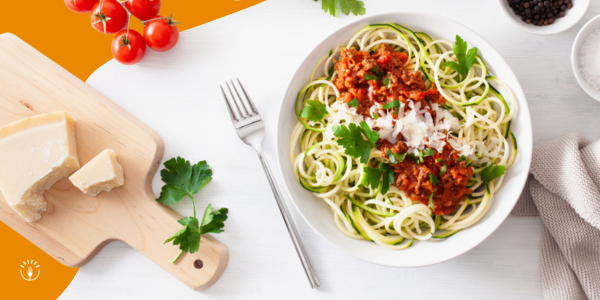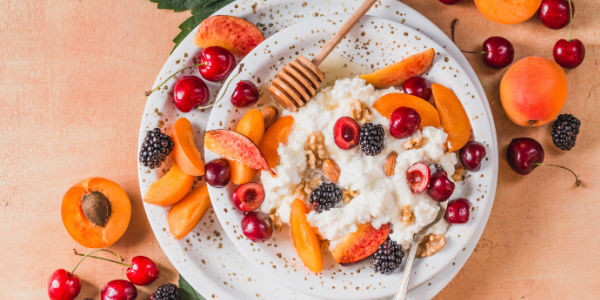
18 "Health Foods" That Really Aren't Healthy
1. Gluten-Free Bread
With the negative associations wrapped around bread, people tend to associate a gluten-free variety as a healthier option. While some individuals need gluten-free bread, including those diagnosed with Celiac disease or gluten sensitivity, it is important to realize gluten-free is not synonymous with healthy, as these products can still be chock-full with added sugars, oils, and calories.
2. Whole Grain Cereal
While you made the executive decision to opt for the whole grain cereal over the colorful box of your childhood, was it truly a more nutritious choice? Comparing the Nutrition Facts labels is recommended on your end, as whole grain cereals can still contain heaping amounts of sugar. Convenient oatmeal packets are also likely loaded with sugar and a reason why you should be making these overnight oats.
3. Muffins
Don't let the fruity name fool you... Whether banana nut, blueberry, or cinnamon apple, muffins purchased from bakeries and store shelves tend to be loaded with sugar and may not be any better (and perhaps worse) than that donut you made a conscious attempt to avoid.
4. Yogurt
From the exterior, yogurt appears as a nutritious snack, offering calcium, protein, and natural carbohydrate. But spoon in a little deeper, particularly if advertised as a fruit flavor, yogurt is loaded with added sugars. But with a little consideration and manipulation, yogurt can be one of the best healthy foods to eat. As a general rule, opt for a plain Greek yogurt, as it offers the greatest protein without supplying the unwanted sugar. You can also enhance nutritional content and flavor by topping with fresh fruit, nuts and nut butters, cinnamon, and honey. Oh... And be cautious of the granola often used to top yogurt, as it also tends to be packed with added sugars and oils.
5. Frozen Yogurt
Speaking of yogurt... Though often presumed as a healthier-for-you choice, frozen yogurt tends to be loaded with sugar and add on the toppings, it is oftentimes not much better than other dessert options. Scoop out more answers to "Is frozen yogurt healthy?" and find out how to fit it into a balanced diet here.
6. Smoothies
Smoothies can be tricky, as some can nourish the body and even aid in weight loss. However, the convenient smoothie packets or ones grabbed through a drive-thru may be hindering your weight loss success, as fruit smoothies may lack an ample protein source, leading to quick energy that only plummets and leaves you hungry within the next hour or two.
7. Juice
Similar to the concept of fruit smoothies, juices may also be nothing more than concentrated sugar. Nutrition experts encourage individuals to go for a whole piece of fruit, rather than its juiced counterpart left without its valuable fiber content. And if you are to go for juice, look for a real fruit juice (not the ones made from concentrated sugars) and stick to a recommended portion size, or a 4-ounce glass.
8. Veggie Chips
The nutritional value of veggie chips can be conflicting, particularly as veggies boast with nutrients and, well, chips tend to lack nutritional value. But when it comes to the combination of "veggie" and "chips", do not let "veggie" in front of the name lead you astray, as they often lack adequate nutrients and should not displace veggies in their raw or cooked form.
9. Trail Mix
Yes, nuts and seeds are a valuable healthy fat. But when combining them with chocolate chips and candy-coating them to produce a "healthy" trail mix, you might as well be opting for a nut-based candy bar. Be cautious of trail mix ingredients or prepare a homemade variation, even dividing them out in small bags to keep portions in check.
10. Health Bars
While some health bars, including fiber and protein bars, can be quite nourishing, they are mostly comparable to a candy bar. Even claimed "natural" bars can be loaded with sugar, corn syrup, and canola oil, ultimately offsetting the nutritional value of nuts, oats, whey protein, etc. So to withhold the desirable convenience and health factor, prepare these portioned energy balls, free of unnecessary ingredients and loaded with nutrients and flavor.
11. Canned Soups
While they may be convenient, the advantage of canned soups might just stop there... Whereas the caloric density of some soups may be low, do not let it overshadow the high sodium content. In fact, a serving can contain up to 800 milligrams of sodium, which is more than one third of the daily sodium limit recommended by the American Heart Association (AHA), or 2,300 milligrams. If you are to select a canned soup, opt for a low-sodium option, aiming to not exceed 350 milligrams per serving.
12. Tomato Sauces
Tomato sauces may appear like a healthy option similar to soup, but they often come with hidden sugars. The AHA encourages men and women to consume no more than 38 and 25 grams of added sugar, respectively, on a daily basis. That being said, take advantage of the Nutrition Facts and Ingredients labels or prepare a homemade variation, ultimately limiting added sugar and salt and utilizing fresh or dried herbs for added flavor depth.
13. Fat-Free Salad Dressings
While the amount of dressing used should always be considered, the type used needs to be factored. Even as "fat-free" salad dressings seem like a healthier option, they are often packed with sugars and sugar substitutes. Like choosing tomato sauces, use the Ingredients label to make well-informed selections and reduce unwanted ingredients by preparing a homemade dressing for the ultimate ingredient control.
14. Sugar-Free Treats
If you ration healthfulness, a greater portion, or an extra serving based on being titled "sugar-free," you may want to read on... While so-called "sugar-free" cookies, cakes, and other sweet treats may be devoid of refined sugar, it is also likely filled with artificial sweeteners and other to compensate for underrepresented flavors.
15. Margarine
Perhaps the popularity of margarine rose as the fear of fat heightened. However, all fat is not treated the same, as the the trans fat often used in margarine is highly discouraged related to its link to a host of health concerns. So instead of trans fat-filled margarine, stick to a moderated portion size of butter or use healthy oils, such as olive oil, in cooking.
16. Turkey Bacon
Speaking of fat... Let this meaty fact sink in: Processed meat consumption has sufficient and convincing evidence that it is carcinogenic (cancer-forming) to humans, with 34,000 cancer deaths per year associated to diets filled with highly processed meats. From turkey bacon to chicken nuggets, processed meats are proteins that go under some sort of transformative process such as salting, curing, and fermentation to enhance flavor and increase preservation. Although the exact "safe" level of processed meat is unidentified, individuals should limit processed meats to once or twice per month.
17. Diet Soda
Consuming diet over regular soda seems like a healthful swap and reasonably so, especially compared to the whopping average of 35 to 40 grams per one 12-ounce regular soda tends to supply. However, even considering the zero sugars in diet soda, health experts and researchers suggests diet soda is still bad for you, as the artificial sweeteners in diet soda may still cause weight gain, increase waist circumference, spike blood sugars, and compromise good oral health.
18. White Wine
Especially as the Mediterranean diet continues to be advocated for, wine sits on a pretty tall pedestal. And while red wine has shown to be cardio-protective (in moderate amounts...), its white counterpart may be quite damaging to health. In fact, white wine may even be increasing your risk of skin cancer.
Then What Are Healthy Foods to Eat?
While nutrition experts try to discourage the concepts of "good" and "bad" foods, there certainly are better-for-you foods. Along with being mindful of the foods above and complying to the practice of moderation, healthy foods to eat on a regular basis include whole grains, fruits and veggies, lean and plant-based proteins, and healthy fats, along with these more specific diet foods for weight loss.
If desiring a more convenient approach to eating healthy, look no further than bistroMD! Being the nation's leading weight loss meal delivery service, bistroMD delivers well-balanced meals straight to your doorstep. Along with being founded by Dr. Caroline Cederquist and foodie Ed Cederquist, a team of seasoned chefs and dietitians prepare and approve nutritious and delicious meals to offer the flavors you desire and ensure the nutrients you need. For more information on bistroMD and offered program options, visit the official webpage here or call 866-401-3438 today!







